#emotional and gut wrenching and poignant
Explore tagged Tumblr posts
Text
I hate the “we went back in time and now everything is fixed and nothing that we did actually happened now” ending. Let the consequences exist, do not erase them. Something something learning to grow despite the darkness something something accepting the hard choices that were made something something loving despite the inevitability of fate.
Do not erase the people they became. Do not erase the sacrifice they gave. Do not erase the love they gained.
#just fuming over these beautiful stories that were absolutely incredible#emotional and gut wrenching and poignant#AND CONSEQUENTIAL#that were undone in a moment by the#oh actually we went back to the past and now only a few remember#it happened but also it didn’t#even if that wasn’t a horrific time paradox#it still undermines the beauty of the story#this is specifically about#manifest netflix#and#the empirium trilogy#which I loved!#but both endings made me want to punch a wall#red rambles
19 notes
·
View notes
Text
"can we talk about how [male character]'s death is so gruesome purely for shock value??" they had sadie adler coming fresh from being imprisoned and having her husband murdered, gets threatened by micah, and then he burns her house down. they had katherine braithwait get shot and dragged around by the hair forced to watch her whole family murdered, screaming and crying the entire time its happening, and left on a shot of her crawling back to her burning house because they refuse to even kill her. they had molly o'shea abused and neglected leaving her crying and miserable the entire duration of canon only to come crawling to death with open arms, yet she isnt even allowed the death she wants, and is instantly willfully forgotten about by everyone but the women. they had susan grimshaw desperate to defend the one thing she had left and she was shot in the side and left to bleed out as we hear her cries. they had abigail crying and begging john not to leave while he and sadie and charles ripped her husband away from her just as she got him back. they had bonnie mcfarlane abused tortured and nearly hanged for daring to help an idiot who wanted to get himself killed. they had luisa fortuna lose her entire family and then die for a man that doesnt even remember her name. for all of rdr1 you are witnessing nonstop horrors and abuse of almost exclusively women. there is a constant fixation and obsession with misogynistic suffering and anguish in these games, whether you believe it to be handled well in either one or not. when men die, it is typically swift. we see the death itself, the camera even flicking away while men die in some scenes. yet every womans death (literal or metaphorical) or anguish seems to be stuck adhering to a misery quota, where we must watch them suffer before they are allowed to pass. we must watch them scream and cry and beg for it to be over or for something to save them beforehand. and then we must watch the act itself as well.
personally i think they couldve done a lot worse with mens death scenes. really.
#not tagging this but like jesus christ. least misogynistic fandom ive been in#there is an even larger misery in lennys death being so swift. not even lingered on remotely. hes not even allowed a cutscene.#but man. it gets over quick. every woman i like i have to watch suffer before her inevitable end#she must monologue like she is perforning a part in theatre#which. really. isnt she always#this isnt even me complaining abiut these scenes necessarily. they were intentionally made to be more emotional and gut wrenching#im complaining because despite that theyre all ignored#kieran and sean both get jerked off for dying tragically all the time meanwhile for molly its just 'look at her kiss the pretty blond bitch'#yall wont even play around with sadies dutch parallels idk why im pretending like this fandom cares about the women at all#the women get as dragged out and poignant death scenes as arthur and theyre all treated like they dont exist
7 notes
·
View notes
Text
Ways to hit your readers in the gut
When it comes to writing, there's a profound and mesmerizing way to touch your readers deep within their souls. It's about crafting moments that hit them in the gut, stirring up intense emotions and forging an everlasting connection. Here are some techniques to help you achieve this:
1. Unexpected Loss: Introduce a character who captures hearts, only to snatch them away suddenly. Think of J.K. Rowling's "Harry Potter" series, where the abrupt departure of beloved characters like Sirius Black and Fred Weasley leaves readers shattered, their grief a testament to the power of storytelling.
2. Sacrifice for a Cause: Show a character willingly sacrificing their own happiness or even their life for a greater purpose. Suzanne Collins' "The Hunger Games" portrays Katniss Everdeen's selflessness, volunteering as a tribute to save her sister, evoking empathy and admiration.
3. Unrequited Love: Explore the agony of unrequited love, where hearts ache and souls yearn. Charlotte Brontë's "Jane Eyre" delves into the bittersweet and heart-wrenching tale of Jane's unfulfilled affection for Mr. Rochester, resonating with readers who have experienced the profound depths of unrequited longing.
4. Betrayal by a Loved One: Peel back the layers of trust to reveal the sting of betrayal. George R.R. Martin's "A Song of Ice and Fire" series delivers shocking betrayals that shatter readers' expectations, leaving them stunned and heartbroken alongside the characters.
5. Overcoming Personal Demons: Illuminate the struggle against internal conflicts, be it addiction, guilt, or haunting trauma. Anthony Doerr's "All the Light We Cannot See" explores Werner's moral compass during wartime, captivating readers as they witness his battle for redemption and personal growth.
6. Injustice and Oppression: Shed light on the injustices characters endure, igniting empathy and inspiring change. Harper Lee's "To Kill a Mockingbird" reveals the racial prejudice faced by Tom Robinson, awakening readers to the urgent need for justice and equality.
7. Parent-Child Relationships: Navigate the intricate tapestry of emotions between parents and children. Khaled Hosseini's "The Kite Runner" unearths the complexities of the father-son bond, evoking a myriad of feelings, from longing and regret to hope for reconciliation.
8. Final Farewells: Craft poignant scenes where characters bid farewell, whether due to death or separation. Markus Zusak's "The Book Thief" gifts readers with heartbreaking partings amidst the backdrop of World War II, leaving an indelible mark of loss and the fragile beauty of human connections.
9. Personal Transformation: Illuminate characters' growth through adversity, offering a beacon of hope and inspiration. Charles Dickens' "A Christmas Carol" narrates Ebenezer Scrooge's extraordinary journey from a bitter miser to a beacon of compassion, reminding readers that redemption and personal change are within reach.
10. Existential Questions: Delve into existential themes that provoke deep introspection. Albert Camus' "The Stranger" challenges readers to ponder the meaning of life through Meursault's detached and nihilistic worldview, prompting them to question their own existence.
With these techniques, you have the power to touch your readers' souls, leaving an indelible impression. Remember to weave these moments seamlessly into your narrative, allowing them to enrich your characters and themes. Let your words resonate and ignite emotions, for that is the essence of impactful storytelling.
#writing#writing tips#character development#writer on tumblr#writerscommunity#writer tumblr#writblr#writing advice#oc character#writing block#writing habits#writing help#writersociety#fanfic
1K notes
·
View notes
Text
Look, it's probably still not time to go really deep into it, but I did mention there are ways this ending where Tomura dies could work for me. Honestly I didn't have much of an issue with chapter 423 itself before the internet's emotional onslaught over it, but now that I'm hearing rumors the chapter was received well in Japan and a number of western fans have decided to couch all their disappointment in racism and rage at the target readership, maybe I should give some cursory thoughts just to counteract the stupid.
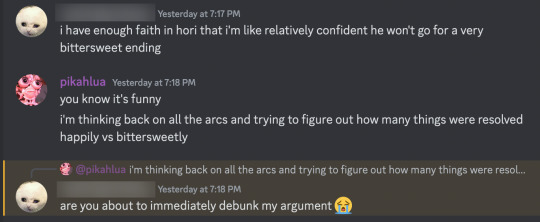
The Bittersweet Ending
Here's the thing. For all the game the bird app likes to talk about how MHA is happy and kid-friendly and not dark and that's bad somehow, it's kind of funny to me how little MHA actually meets expectations in that regard. If I were to divide MHA arcs into categories based on their endings, I would probably have to put the majority of them into the "makes me cry" category. Even arcs where the hero wins with ostensibly happy endings often have absolutely gut-wrenching moments, like All Might's retirement in the Kamino arc, Tsuyu's apology in the UA Dorm Contest arc, and Nighteye's death in the Overhaul arc. I don't think it's possible for me to watch the Sports Festival arc and come out of it with anything but mixed feelings of hope and haunting. Stain may have lost his battle, but his effect on society sure seems to give him the win when it comes to the war. The Paranormal Liberation War arc has a pretty rough ending where there may still be a sliver of hope, but goodness is it a small one.
Sure, some of the teariest moments are a result of happy scenes like Eri smiling for the first time at the cultural festival, but what I'm getting at is that MHA tends to go for more hopeful endings rather than happy ones. And those hopeful endings are often stained by some other tragedy, a price to pay for the hope. Just because MHA isn't full of random death doesn't mean it doesn't contain poignant loss. This was one of its early selling points in fact. MHA's most hopeful moments have always felt so real because the story acknowledges that these things should often play out messily. We've seen the mess, and now chapter 424 has given us a glimmer of hope. The question is now where the story will take us from here.
The Anticlimax
This post has come back for me in the most unexpected way, not gonna lie.
I often hear “anticlimax/anticlimactic” used as a negative criticism, especially colloquially. This criticism assumes an anticlimax is always written unintentionally. But that’s often not the case; anticlimax is actually fucking fantastic when placed in the right hands. And Kohei Horikoshi is a goddamn anticlimax connoisseur. I say he’s a connoisseur because Horikoshi has the gall, nay, the gumption–dare I say the balls to showcase the versatility of anticlimax as a storytelling technique for more than just comedy (although he does also use it for comedy a lot). He dares to use it in action scenes, horror/thriller scenes, and even fuzzy heartfelt scenes, all to the great effect of toying with our emotions. And he successfully has us feel exactly what he wants us to every time–because that’s the point. These aren’t cheap jokes; they serve a purpose! They illustrate an actual, meaningful point about whatever scenario they are used in to make the story more realistic, to combat the fridge logic “well actually” complaints endemic to fandom. Because Horikoshi is a fan himself.
When I write "realistic," I don't mean to apply this quote here to indicate that death (especially for edgy aesthetics) is realistic. I mean to indicate that imperfection is realistic. Izuku isn't a perfect hero. Tomura isn't a perfect victim, and by victim I mean "character for the hero to save." Izuku says it himself:

A perfect victim for the hero to save would yield to the hero's attempts to turn and save them. They would see the wisdom in the hero's position and 100% change sides to agree with them. Trite.
Doing this runs the risk of erasing the victim's identity that comes before. Izuku never has a perfect answer to all of Tomura's problems with the world.
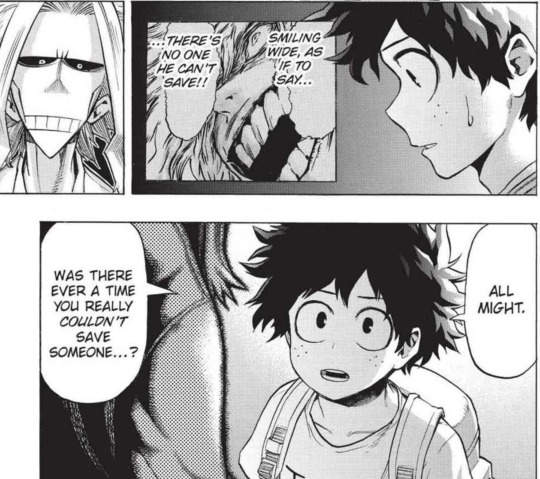
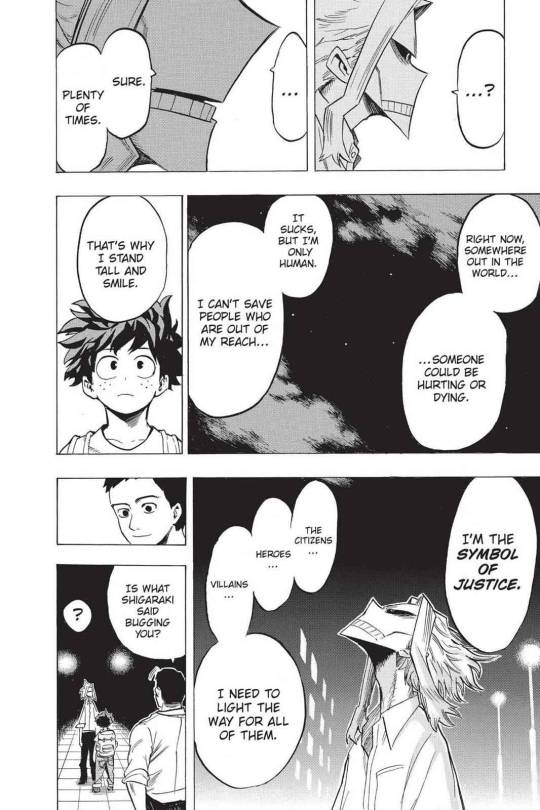
Izuku is the same as All Might. He's only human.
[...]Horikoshi has no compunctions using anticlimax in big, important, non-humorous scenes (even if the anticlimax ultimately adds humor to the scene that was otherwise unexpected). This man has no fear. He ends his famously popular take on the tried and true trope of tournament arcs with one big let-down that affects not just the audience but the in-universe characters. [...] You wanna tell me Horikoshi didn’t know exactly what he was doing here? You wanna tell me Horikoshi didn’t know about the fandom war over Katsuki’s hero name? That he didn’t purposefully fucking troll the fandom with this? That this isn’t the single greatest brick joke in the history of published media for its effect both in the canon and in the meta? Fuck you, we’re building up the tension around the most wildly popular character’s hero name reveal for 248 goddamn chapters (that’s five-and-a-half years) just to make it the cringiest fucking thing you’ve ever heard in your goddamn life. His hero name must be the closest audio rendition anyone can imagine shaped like a middle finger and fucking nothing less will suffice. Congratulations, fandom: you played yourselves! You made a war no one could win! Horikoshi could have chosen Ground Zero or Kacchan as Katsuki’s hero name and risked alienating half his fandom either way, but you didn’t realize there was a third option, which of course he took: to risk alienating the entire fucking fandom.
I'm just saying, an ending like this isn't out of character for Horikoshi. In light of this trip down memory lane and Izuku's parallel with All Might in that they acknowledge they cannot save everyone, I'm interested to see what Horikoshi does with this ending whether or not Tomura survives. What sort of hope will he offer?
The extended ending arc
The only real extended ending arc we've had in MHA that might give us a glimpse at the inner workings of Horikoshi's mind is the School Cultural Festival arc. Because of that (and the many other things I've mentioned before this post), I will say there is cause to believe we will have a hopeful ending. Again, I don't know what that looks like. A lot of people seem to have a specific thing they need to have happen to save the story for them, and I cannot speak to those.
Except for Deku vs Kacchan 3, which is what I need to have happen lol. And god does it seem really fucking possible now.
111 notes
·
View notes
Text
𝐓𝐇𝐄 𝐒𝐔𝐍𝐁𝐈𝐑𝐃'𝐒 𝐒𝐈𝐗 ( rockin'roll ! )
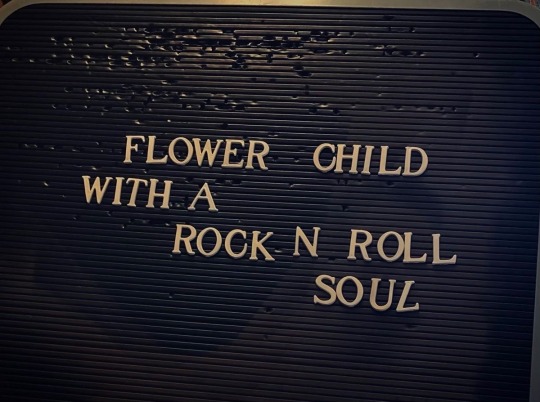

"and if you don't love me now, you won't ever love me again."

★ 𝐓𝐇𝐄 𝐒𝐔𝐍𝐁𝐈𝐑𝐃'𝐒 𝐒𝐈𝐗 / the 70's rock band that took teyvat by storm
ISSUE 01. Everyone knows who The Sunbird's Six were. Their songs revited through the nations: tender and ethereal with each poignant verse. Yet, the group of six showed they could sing verses of ardour while thirsting with unrequited rage that tore souls apart in one sitting. Their debut and only album ‘Vermilion’ was hypnotic and utterly divine. It was a mosaic of winsome pieces that were put together to make one gut-wrenching album that you ultimately ugly cry to.
SO WHO WAS THE SUNBIRD'S SIX? Comprised of four founding members from Mondstadt, one from Snezhnaya, and the other from Fontaine, we get a cast of Teyvat's most talented musicians. Specifically, Diluc Ragnvindr as lead guitarist, songwriter and vocalist and ( Name ) St. Laurent as lead vocalist and songwriter. The duo bewitched the throng and perhaps themselves with both their flaming allure and vocals. Youth of the 70's wanted to become ( Name ) with all her charm and freedom while some fans died to get a strand of Diluc's hair alone. The other members include Jean Gunnhildr on keys, Rosaria on drums, Kaeya Alberich as bass guitarist, and 'Childe' as rhythm guitarist.
ISSUE 02. Yet, as The Sunbirds Six became a renowned household and rock name, their disbandment remains unknown- until now.

★ 𝐏𝐑𝐄𝐕𝐈𝐄𝐖 𝐎𝐅 𝐓𝐇𝐄 𝐈𝐍𝐓𝐄𝐑𝐕𝐈𝐄𝐖 𝐖𝐈𝐓𝐇 𝐓𝐇𝐄 𝐒𝐔𝐍𝐁𝐈𝐑𝐃𝐒 𝐒𝐈𝐗
Kaeya Alberich ( bass guitarist ) : Ha! We were good... too good.
Rosaria ( drummer ) : Back then- things were simpler. You wanted to play? Grab an instrument and fucking play. That was our original motto... until things started getting messy. And by messy I mean Diluc and Childe. Maybe even ( Name ) too. *Sighs* Actually, all of us. But, you can't write an album like 'Vermilion' without going through all that shit.
Jean Gunnhildr ( pianist ) : When the four of us first came together, we were decent. We all loved playing- some more than others- but we were okay! *Smiles slightly* But, if you're going to go beyond the walls of the Ravginder basement- we needed more.
Childe ( rhythm guitarist ) : Do I sit here? *Laughs* Oh okay. When I was invited to join the band- I said, "Okay, my partner will join too." and of course, there was zero objection cause you don't find a musician like ( Name ) anywhere... a small part of me selfishly wishes that she [ ( Name ) ] said no when I asked. *Laughs* But who am I kidding? I'd go through all that again and again... even if it meant dealing with Diluc-
Diluc Ragnvindr ( lead guitarist ) We only needed another vocalist, a female one. So, we found one.
Kaeya : I was the one who told him we needed a female vocalist and I found her and Childe.
Rosaria : Rockin' roll is not serious till you really add whatever emotions ( Name ) had in the mix- and that's exactly what she did.
( Name ) St. Laurent : *Smiles sweetly* It was ugly, so ugly. However, bygones be bygones. It was only rockin' roll.
Diluc : It was not just rockin' roll.

★ ARTISTS AND OTHERS. Diluc Ragnvindr, 'Childe' or Ajax, Jean Gunnhildr, Rosaria, Kaeya Alberich, Zhongli, Lisa, Neuvillette, Albedo Kreideprinz, Xinyan, Pantalone, Rosalyne Lohefalter and more.
UPDATES AND POSTSCRIPT. Updates at least once a week (subjective to change). Female pronouns and vocal references.
SIDE COMMENTS. I love rock so let’s combine both. (If you genuinely understand the song reference in the beginning you are my friend now). Inspired by Fleetwood Mac, Stevie Nicks, Florence Welch, the ambient sounds of the 90’s (Mazzy star and Mojave 3), Daisy Jones & the Six and of course the 70’s. Warnings will be in each chapter.
WHAT DO THEY SOUND LIKE? Here is a playlist of the previous artists and more to give you a feel!

★ 𝐕𝐄𝐑𝐌𝐈𝐋𝐈𝐎𝐍 / the album , track 01
expect occasional changes to the track as the story develops
PREFACE — who are you? WILD CHILD — don't stop the music!
Vermilion
Stay Around (or not)
Reverie
Don’t Look Back Now
Runner Up
Tell Me You Love Her
Bright, Young, Woman
The Voices
White Lies
Visceral
Underneath My Skin
Valberry
Gone to Waste
Shoot Your Shot
From Afar
Dawn’s Shadow
In Leather and Faux Fur
Two for Two
My Monoceros Caeli
Deep Six
INWARDS NOT OUT — tell me, how have you been honey?

TAGLIST. @aphrodict @tragedy-of-commons @tipheeweefee @nyoomiin @https-mika @stvrdew @kascar-chronicle if you are interested in becoming part of the taglist, then drop by through an ask!
#( THE SUNBIRDS SIX )#—stellaronhvnters.#genshin x reader#genshin impact x reader#genshin impact x female reader#genshin x female reader#genshin impact fluff#genshin angst#genshin fanfic#genshin diluc#diluc x you#diluc angst#diluc x reader#diluc ragnvindr#diluc fluff#diluc ragnivindr x reader#genshin childe#genshin ajax#genshin tartagalia#childe x reader#childe x you#ajax x reader#tartaglia x reader#childe x fem!reader#genshin series#genshin impact x you#genshin au#genshin impact au#writing ᝰ.ᐟ
73 notes
·
View notes
Text
Moments on Film: Carmy and “Just Keep Going”
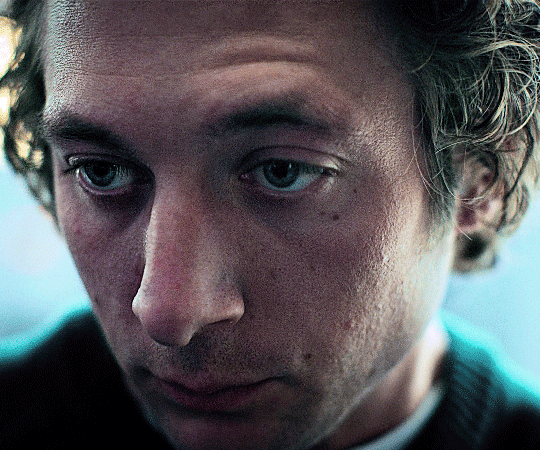
“Just keep going” is a recurring mantra in The Bear. The first time we hear it, it’s Marcus telling Sydney as he helps her clean up the spilled veal stock in S1. Cousin Michelle says it to Carmy during their poignant scene at the Christmas dinner. Carmy says it to himself by replaying Michelle’s words in his head as he awaits the results of the fire suppression test. The last time we hear it, Carmy says it to Sydney to help her focus and calm down as she’s recovering from Marcus’s outburst in the S2 finale.
I think “just keep going” has been Carmen’s personal mantra his entire life. It has had to be. And while it may have served him well in years prior, I believe it has now, finally all caught up with him.
Because of Carmy’s traumatic and abusive upbringing, he has trained himself to never properly reflect on what just happened. How could he possibly? From what we have been shown so far, his mother is extremely abusive, controlling, manipulative, and threatening. In their brief scenes together, she called him by his brother’s name, threatened him to the point that I believe she physically abuses him, and in fact slapped his face while he was very sweetly comforting her and trying to calm her down. The look on his face after being slapped is gut wrenching, mainly because, as always, there’s so much in his expression—a world of hurt and emotions, and you know he will never tell anyone about what she just did. All he can do is repress his feelings, suppress the urge to react in any way, and literally just keep going. He has to. It’s how he has survived. And it’s killing him.
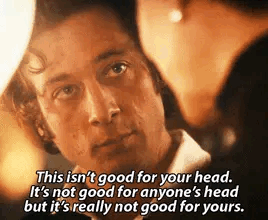
Gif source: @sarcasmcloud
We still don’t know what Carmy’s relationship with his dad was like. He says he “didn’t really know him well enough to miss him.” Is this true? Or did Carmy also have to survive physical and emotional abuse, in addition to neglect from him, starting at a very young age? Either way, he’s had to keep moving forward and not look back, likely afraid of what will happen if he stops and actually does. This is another reason why he’s always scanning people’s faces, body language and tone to see if they’re mad at him, and waiting for the other shoe to drop. He has been surrounded by erratic, unpredictable behavior. He has had to think ahead, plan his next move, anticipate people’s behavior, reactions and responses so he can be prepared. He has had to live a life of propulsion, never looking back. Staying still, reflecting on the abuse he has had to survive as well as the recent trauma of his brother’s suicide could potentially cause a complete and total nervous breakdown, so he pushes on.
In the flashback scene in New York, we get another, heartbreaking example of how “just keep going” is killing Carmy. His boss is an emotionally abusive tyrant, but for Carmy to call it out, first he would have to acknowledge it. To do that, he might also have to think about and acknowledge the abuse he’s suffered, likely from his dad, certainly his mom, possibly his “uncle” Lee, even his brother. He is not ready to reckon with any of the abusive behavior in those relationships, so he keeps his head down, and does anything he can to get through the day, even if that means vomiting his unspoken feelings out of his sick and exhausted body before every single shift.
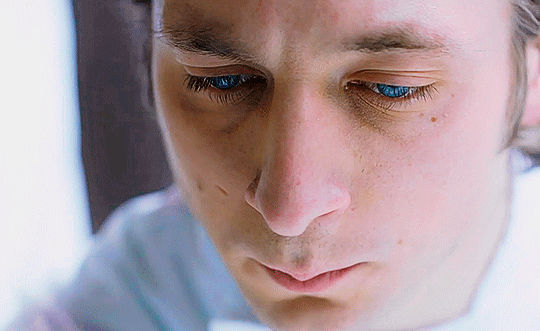
Even before New York, which—ironically and devastatingly, was supposed to be a time where he could “decompress” and escape the trauma at home, he was doing anything and everything to stay ahead of slowing down and facing what he’s been through. For years he’s been putting one foot in front of the other, scared to look down, lest he fall off the tightrope.
Presumably since after high school, he’s been traveling around, and in constant motion. Numerous restaurants in California, Copenhagen, then New York. Carmy has so much unprocessed trauma from multiple sources that has never really dealt with, he’s literally been on the run. He has been distracting himself and filling the void by throwing himself into work, and in the words of cousin Michelle at Christmas dinner, he has, in fact, been, “running around like crazy.” He might change his location, but his unprocessed trauma follows him everywhere he goes, causing him paranoia, anger, shame, guilt, self loathing, dread and fear. It’s also made him sick.
The only way to escape is to never be idle for a second, which is why he’s in constant motion. Carmy as a character is rarely completely still. His hands are constantly moving, in S1 in particular he is perpetually running his hands through his hair, feeling his forehead, smoking, and fiddling with his spoon. He hands tremor and tremble when there’s nothing to occupy them. None of this is an issue when he’s scrubbing floors or furiously chopping vegetables. He can be so unsettled and it all stems from the need to stay in motion to distract himself.
Life in a kitchen can easily swallow someone’s entire life. There’s always so much to do—from the prep to the cooking, the tasting, managing staff, actual service, cleaning, ordering supplies, and doing it all over again to keep the place running. Orders come in that have to be filled. It’s relentless, and at the highest level, requires complete and utter focus to be completed successfully. Natalie correctly points out the toll the restaurant takes on Carmy in her first scene with him. “It’s eating you alive”, she tells him. And it is. In S1, Carmy talks about how much time they would spend cleaning at The French Laundry. It’s hard to let your mind wander when you’re in motion and just keep going, so that’s exactly what Carmen does.
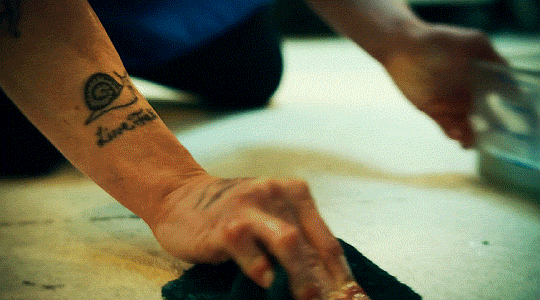
The rare moments where Carmy does pause and rest, he has life threatening night terrors, crippling nightmares, and horrible anxiety. In a prior post I analyzed Carmy’s visibly elevated vital signs in S1 and S2. He is so repressed and stressed out it impacts his entire body. With no outlet, his unresolved trauma, undiagnosed PTSD and extreme anxiety manifests inwardly and makes him ill. His dangerously heightened pulse and heartbeat are often visible onscreen. He has trouble breathing. He’s constantly chewing tums or chugging Pepto Bismol to calm his stomach. One of the few items in his apartment visible to Sydney as she enters is a giant bottle of ibuprofen. As I mentioned before, he often looks sick. There’s so much tension coursing through his body sometimes he actually looks like he’s burning up with fever. He’s not taking care of himself. He’s not eating well, and he barely sleeps. His coat is too thin for the freezing Chicago weather, and that’s when he actually wears it to go outside. He blinks his eyes hard in stressful moments, which is a trauma response. The way his body reacts during his panic attacks is frightening. There have been several moments where he looked like he was going to collapse and have a heart attack.
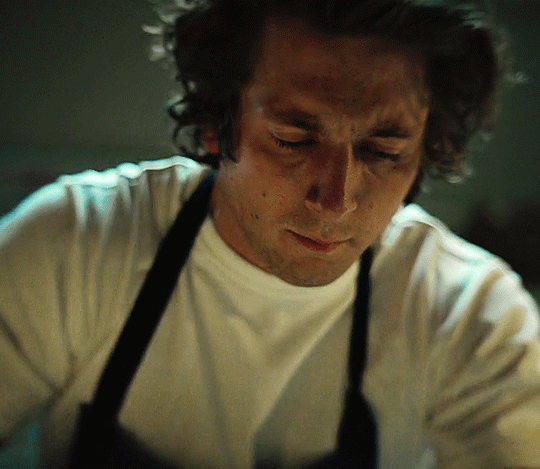
He has been running around, over working himself, repressing his emotions and feelings, neglecting his own needs, health and happiness and in constant motion for probably the past decade. As I detailed in a prior post, Carmy is lost at the present because he’s never allowed himself to slow down and find out who he really is and what actually makes him happy. He’s been in complete and total survival mode.
There is no way he can keep up at the level he has been operating and not completely collapse at some point. I think that’s a huge reason, subconsciously, that he slipped into the relationship with Claire. Among other reasons, he is exhausted and it was a way out and seemingly a soft place to land. She is also probably the first person to physically touch him, maybe in years. Of course he wanted to lean into the potential comfort and care that he thought she might be able to provide. He needs touch and tenderness so desperately that he invited her to the restaurant, his sacred space, mere seconds after she stroked his face, a turning point in their “relationship.”
Claire initially allowed him just enough relief that he wasn’t about to explode. However, in the end, it proved to be such a distraction that it pulled him even further from reality, his duties, and people who he actually should have been spending time with, namely, Sydney. The lack of healthy balance caused him increased anxiety and much more harm than good. His panic attacks actually increased and got worse during his time with Claire. She also only served to unhealthily unearth the past he’s been running away from by bringing painful memories he’s tried to suppress screaming to the surface.
I am very worried about where a potential next season(s) will take Carmy, emotionally and physically. He is headed for a serious crash and burn if he thinks he can just ignore his numerous health problems and keep running from his past. He is only human. They will all catch up with him and I believe they already have.
I’m also worried because we know the writers like to do call backs and tie threads together. Plot points, relationships and lines are never wasted. I’ve said in my posts prior to S2 how badly I think Carmen needs to see a Doctor. The fact that Claire is one, but it never factored into S2 is so odd to me. This is what makes me think we perhaps have not seen the last of Claire.
Carmy physically exhibits crippling distress, and noticeably elevated vital signs, in the form of shallow breathing, rapid pulse, pounding heartbeat and a face that often looks flushed with fever. He actually had a “gnarly” panic attack while he was with Claire. He needs medical attention, but we were never shown her acknowledge this or make a recommendation about the help he needs, or give him tips to calm down, apart from essentially “just ignore your problems and they’ll go away.” This is all so strange to me because Carmy is not well, Claire’s an ER Doctor in residency, and she experienced him during a horrible panic attack. What is the first thing they do at the Emergency Room? Check your vital signs. Can’t she see he’s sick? Wouldn’t she want to help him, personally, not to mention professionally, to get treatment and ease his suffering? It doesn’t make any sense to me.
He has, however, found a new way to self soothe in his most painful moments to calm down his nervous system—with visions of the one thing that helps him stabilize and breathe, visions of Sydney.
I really hope that the next time Carmy and Claire see each other isn’t because he’s being brought to the Emergency Room where she’s a Doctor because of something terrible, like an illness, accident, or major health emergency. That said, I think he is on the brink of a crisis. A major health issue might be the only way for him to stop and actually slow down enough to rethink his life and how he’s been spending it these past years.
Season 2 ends with Carmy believing he needs to double down on his mantra and “just keep going”like he always has, push himself to the max, and sacrifice his entire existence to run the restaurant, but that is not sustainable. It is not service, it is servitude. I believe he is exhausted, burnt out and headed for disaster from living this way for the past decade. He’s a master at masking that he’s barely hanging on by a thread. This is a huge reason why Sydney is his lifeline. Unlike Claire, who’s supposedly “known” Carmy for years, within days Sydney accurately diagnosed Carmy’s problem (S1E2) “you need help”, she told him. She saw through what he was trying to hide, to what he needs most. She caught him before he fell and she’s been holding him this whole time. I honestly believe that by walking in the doors of The Beef, Sydney saved Carmen’s life, but neither one of them truly realizes it yet.
I really hope for the sake of Carmy’s physical, emotional, mental, and spiritual health he will see that slowing down, coming to terms with the abuse and trauma he’s survived, taking care of himself, resting, and getting professional help is a life and death situation for him.
Carmen needs to realize that he hasn’t and isn’t living a full life with the mantra “just keep going.” It has worked so far as a survival tactic but he deserves and needs to live a life where he can be healthy, fulfilled and happy. A life where he’s not just going but growing. I hope he realizes this before it’s too late. For the sake of his health the stakes are extremely high and he has no time to lose. Every second counts, indeed.
©️moments-on-film 2023
#the bear#the bear fx#carmen berzatto#carmy berzatto#sydney adamu#syd adamu#carmy x sydney#syd x carmy#my thoughts#moments on film
273 notes
·
View notes
Text
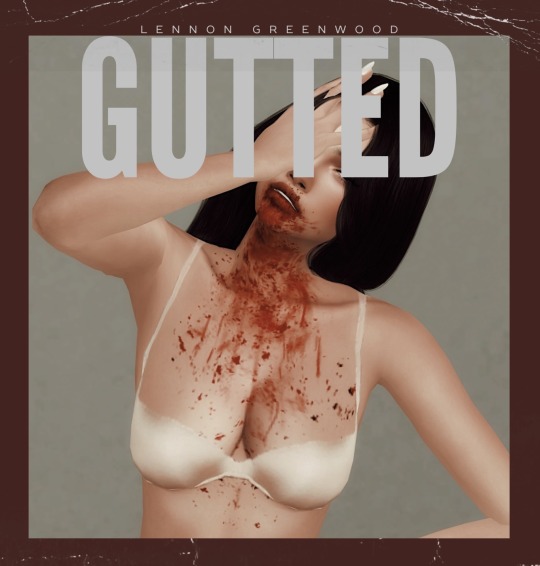
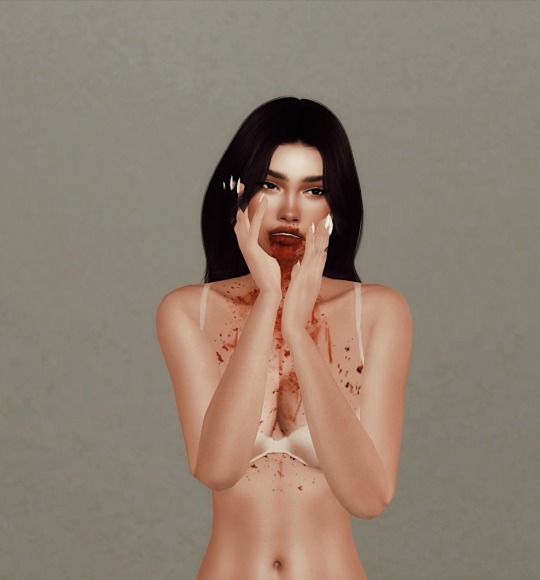
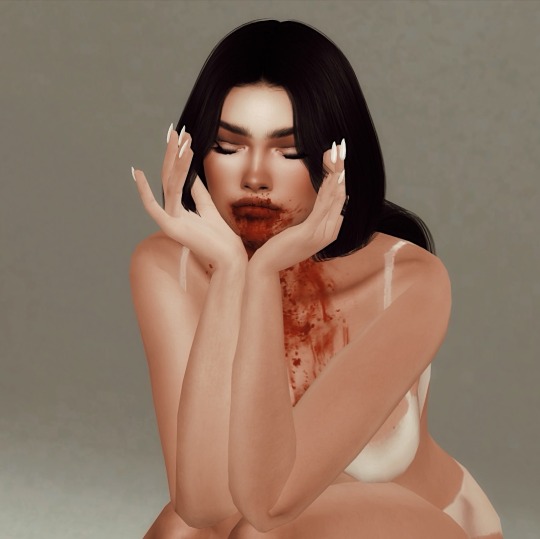
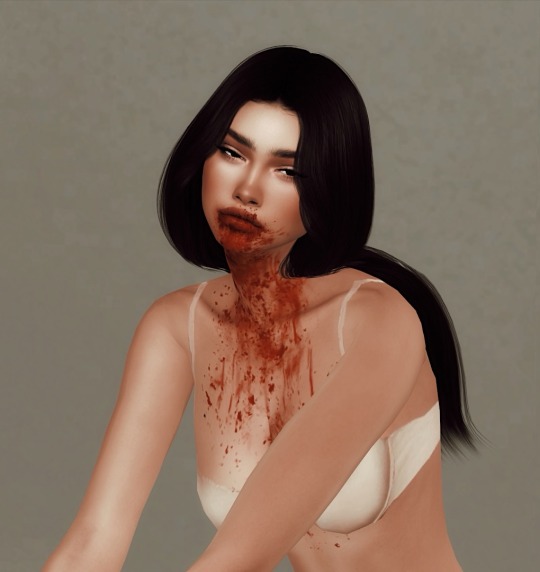
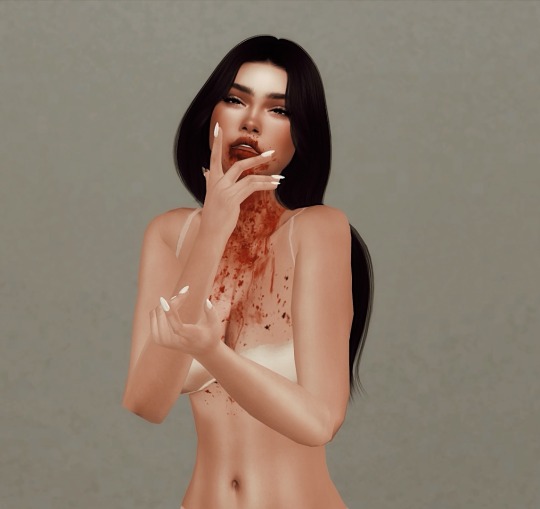
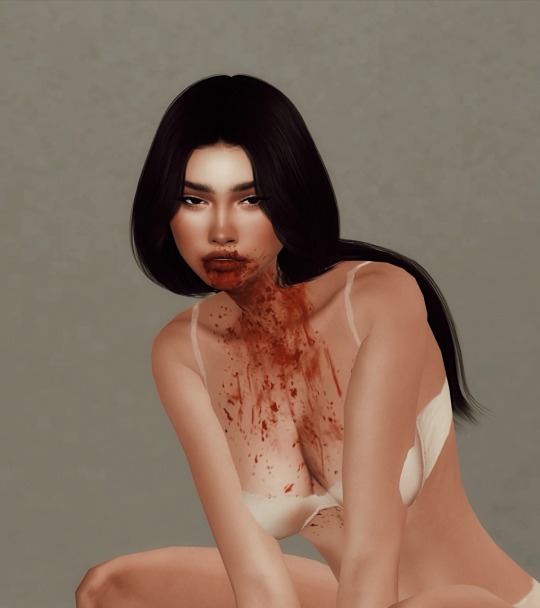
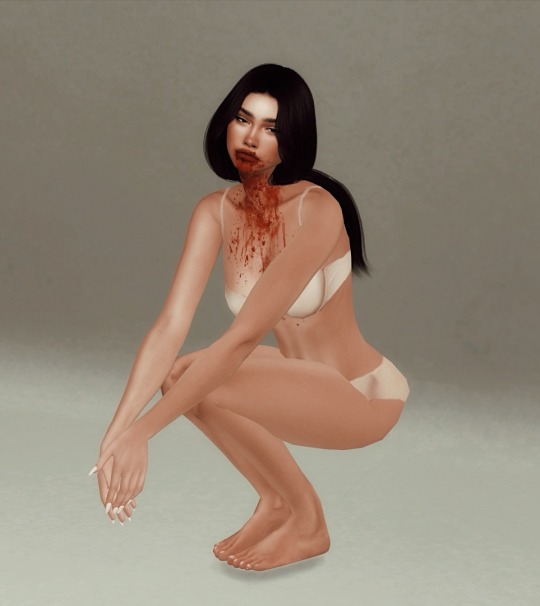

STARBUZZ EXCLUSIVE 💫!
Lennon Greenwood Drops Heart-Wrenching New Album as Divorce Finalizes!
In a whirlwind of emotional turmoil, beloved singer-songwriter Lennon Greenwood has released her most personal album to date, titled Gutted, just as her high-profile divorce from actor Jesse Foster becomes official. The album, filled with raw emotion and poignant lyrics, is already making waves in the music industry, with fans and critics alike praising its authenticity and depth.
Greenwood, known for her soulful hits and powerful stage presence, has channeled the pain and heartbreak of her recent split into a musical masterpiece. The album covers themes of betrayal, loss, and resilience, offering listeners a glimpse into her tumultuous journey over the past year.
The timing of the album’s release has only added to its impact. As news broke of her finalized divorce, Greenwood’s poignant lyrics and haunting melodies in Gutted provided a cathartic outlet for both the artist and her fans. Songs like “Midnight Confessions” and “Crossed Lines” are already being hailed as some of her best work, resonating deeply with anyone who has experienced the sting of a broken relationship.
Sources close to Greenwood reveal that the creative process for Gutted was both therapeutic and challenging, with the artist pouring her heart and soul into every track. Despite the personal pain, Greenwood has emerged stronger, using her music as a powerful means of expression and healing.
Stay tuned, StarBuzz readers, as we continue to follow Lennon Greenwood’s journey. One thing is for sure: this incredible artist has turned her personal heartbreak into a triumphant musical comeback, reminding us all of the power of resilience and the beauty of raw, unfiltered emotion.
#my sims#sims 4#sims 4 cas#sims 4 cc#sims 4 gameplay#sims 4 legacy#sims 4 screenshots#sims 4 story#the sims community#ts4#ts4 story#ts4 edit#ts4 maxis match#ts4 cas#ts4 simblr#ts4 legacy#ts2#ts3#ts4 gameplay#ts4cc#ts4 screenshots#the sims cc#the sims 4#simblr#sims 2#ts4 cc#cc#cc finds#sims 4 maxis match#maxis match cc
28 notes
·
View notes
Text
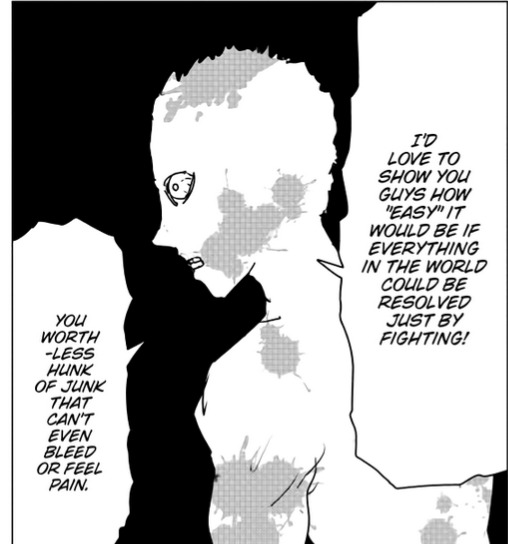
I know there will be several talented people doing write ups on this but I just want to add my own two cents as well because this got me emotional.
The reason I write Garou fanfics so much is because I find his psyche absolutely fascinating and close to my heart. He presents with such anger and sassy cockiness while dealing with so much inner turmoil. And most of the time we don't get to see that inner turmoil but every once in a while ONE/Murata will lift that veil through one panel or a piece of dialogue and we get a glimpse of the troubled young man and all those painful feelings inside. And it's that pain, inner conflict, the vulnerability he guards so closely that I love to explore and that makes me fall for him over and over again.
This panel is one of those. As I've mentioned a while ago, I'm not a fan of the way Garou has been characterised in the manga since he reappeared on the surface at the end of the MA arc and especially not a fan of his characterisation post MA arc. This, however, is the Garou that I love. The troubled young man who pushes his way through life with a heady mix of bravado and stoicism. And then we get this.
"I'd love to show you how 'easy' it would be...' accompanied by a somewhat gruesome inverted panel with blood splatter. To me, this is the first time Garou is letting out his pain and frustration at his loss with Saitama. His ideology, while simplistic, got him through a tough childhood and adolescence. He clung to that goal and shed an exorbitant amount of blood and sweat over it only to discover it was never going to be. The loss of that would be gut wrenching. And finally here we get him giving us a glimpse of that raging pain. Of that vulnerability.
But what gets me even more is the next line "You worthless hunk of junk that can't even bleed or feel pain". This is one of the most obvious and clear times that Garou is coming face to face with his own pain. To me, it's like he's finally admitting that he is in pain. Not physical pain, but just this existential pain that he finds himself sometimes drowning in and doesn't know what to do with.
And then next panel he just goes right back to work with the older guys looking after him which I find so fucking sweet and adorable, telling the lad to put everything down and stop working.
At this point I see Garou starting to deal with all that backlog of pain and trauma. He is not in it all the time but he allows it to come to the surface, holding it, feeling it and then he goes back to this new low-key life. This isn't something he is going to process in one go. This will be an ongoing process. Diving head first into that chaos, those demons in his head, into everything that hurts and unravelling it a little at a time before swimming back to shore and going on with his life.
It's a process that I think is a lot more poignant and powerful than the happy-go-lucky de-fanged puppy characterisation we currently (but didn't used to) get in the manga. The Garou we get in the webcomic still has those fangs, but he lets himself be more than that little by little. One day, he will be at peace with who he really is and every time I think about it, I kinda want to tear up.
#this is why i love him so#garou#garou one punch man#opm#one punch man#garou meta#opm meta#one punch man meta#opm webcomic#one punch man analysis#garo
48 notes
·
View notes
Text
WandaVision: A Genre-Bending Exploration of Grief, Identity, and Superhero Storytelling
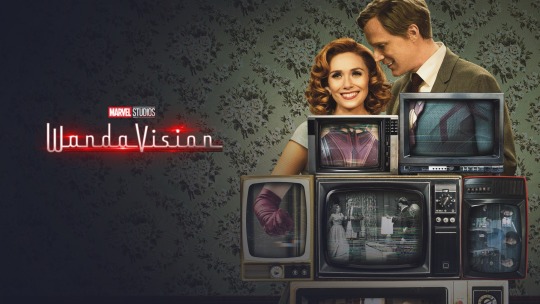
WandaVision is a bold, genre-bending triumph that redefines what superhero storytelling can be. The series opens with a surreal plunge into classic TV sitcoms, paying homage to I Love Lucy and Bewitched—a bold move that quickly proves its worth. WandaVision reminds us that emotional stakes can hit the hardest in a universe of super-powered battles.
Elizabeth Olsen is mesmerizing. Her portrayal of Wanda Maximoff is a masterclass in character evolution, as she moves effortlessly between sitcom whimsy and gut-wrenching emotional depth. Wanda’s desperate attempt to control her unraveling world is heartbreaking and terrifying, and Olsen makes you feel every ounce of that pain. Paul Bettany matches her performance with a comedic brilliance that brings new layers to Vision, turning their shared scenes into captivating emotional duets.
But WandaVision is far more than a love letter to nostalgia—it’s a fully immersive experience. Each episode meticulously recreates a different TV era, from the black-and-white charm of the 1950s to the neon flash of the 80s. The period details, from set designs to costumes, are spot-on, giving the series a rich visual texture. You’d be forgiven for thinking you were watching an episode of The Dick Van Dyke Show—until the cracks in the facade start to show, hinting at a far darker reality lurking underneath.
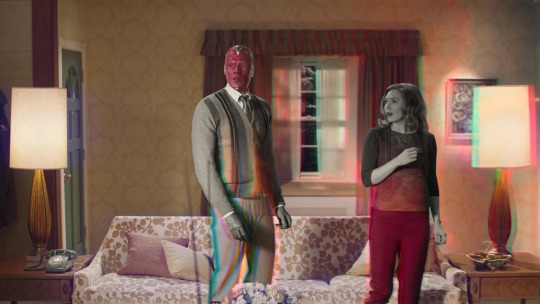
Visually, WandaVision is a feast. The shifting aesthetics aren’t just clever flourishes but integral to the story. As the series moves through different eras of TV, the visual style mirrors Wanda’s emotional unraveling. The glossy perfection of early sitcoms begins to fracture, reflecting the way grief and trauma distort her perception of reality. This isn’t just a fun gimmick—it’s a profoundly affecting metaphor for Wanda’s internal collapse, making her unravel something you feel as much as you see.
At its core, WandaVision is about grief, trauma, and identity. Wanda isn’t just mourning Vision—she’s grappling with who she is after everything she’s lost. Her immense power allows her to bend reality to her will, yet she’s unable to confront the emotional wreckage inside. The show visually represents this struggle, with each glitch and shift in her constructed reality as a metaphor for her fractured sense of self. WandaVision brilliantly captures a woman at war with her identity, trying to reconcile her past, pain, and future.
This identity crisis shapes Wanda’s every decision. Unable to let go of her trauma, she creates a world where she can hide from it. But as the cracks in her illusion grow, it becomes clear that even her immense power can’t protect her from the truth. The show’s layered narrative and visual style turn Wanda’s story into a poignant meditation on how trauma reshapes our sense of self and how running from grief only deepens the wounds.

One scene that perfectly encapsulates this tension is the dinner sequence in the first episode. What starts as a lighthearted sitcom fare quickly spirals into something unsettling as Wanda struggles to control her reality. The laughter fades, the lighting shifts and the discomfort is palpable as her carefully constructed world teeters on the edge of collapse. In moments like these, WandaVision masterfully balances its tonal shifts, moving from quirky homage to psychological thriller with a deft touch.
The series is a slow burn, but that deliberate pacing makes its emotional depth possible. WandaVision takes its time, allowing the audience to sit with Wanda’s grief and confusion. This might feel jarring for some, especially for those expecting the fast-paced action Marvel is known for. But this slower pace is essential to the show’s impact—it gives the emotional stakes time to breathe, and the payoff is worth the wait. As Wanda’s world unravels, the tension builds not through action but through her illusions’ slow, steady collapse.
Marvel’s decision to prioritize emotional complexity over explosive action in WandaVision significantly departs from its usual formula. This shift signals a broader evolution in superhero media that embraces introspection and character-driven storytelling. WandaVision shows that superhero stories can be just as much about our internal battles as the external ones, setting a new standard for what the genre can achieve.
While Olsen and Bettany are the heart of the series, the supporting cast also shines. Kathryn Hahn is a standout as Agnes, bringing comedic flair and a sinister undercurrent to her role. Her shift from a nosy neighbor to something far more ominous is one of the series’ most thrilling transformations. Teyonah Parris, as Monica Rambeau, adds emotional depth to the broader MCU connections, grounding the story while bringing her vulnerabilities to the forefront. Monica’s own experience with loss, having been snapped away and returning to find her mother gone, mirrors Wanda’s grief, adding layers to the show’s exploration of trauma. Both actresses enhance the ensemble, making WandaVision a rich tapestry of performances.
Matt Shakman and Jac Schaeffer deserve immense credit for crafting a show that blends absurdity with emotional resonance. The tonal shifts—from sitcom pastiche to psychological horror—could have easily derailed the narrative, but instead, they heighten the series’ complexity. Shakman’s direction and Schaeffer’s writing push the boundaries of superhero storytelling, resulting in a series that feels as innovative as it does intimate.
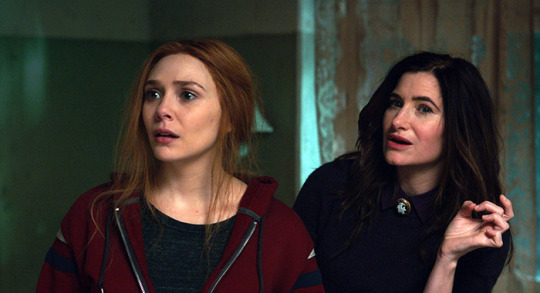
Another scene that stands out is Wanda’s confrontation with Agatha Harkness (Kathryn Hahn) in later episodes. This moment exemplifies the total collapse of Wanda’s illusion, and Agatha’s role as a manipulator intensifies the tension. The scene is a high-stakes emotional showdown that strips away Wanda’s defenses, forcing her to confront the pain she’s buried under layers of sitcom facades. This confrontation highlights the show’s seamless ability to shift from personal drama to supernatural spectacle, all while keeping the emotional core intact.
Of course, WandaVision isn’t for everyone. Its experimental structure and slower pacing may alienate viewers expecting the fast-paced, action-heavy fare typical of the MCU. But for those willing to embrace its reflective nature, the series offers a more profound, more emotionally charged experience. It’s a gamble that pays off in ways that redefine what superhero television can be.
WandaVision isn’t just a standout in the MCU—it’s a standout in modern television. Its blend of genres and experimentation with form transcends the superhero genre, positioning itself alongside Legion, which uses genre as a framework to explore deep emotional and psychological territory. WandaVision proves that superhero stories can be as rich, layered, and complex as any prestige drama, showing that sometimes, the most compelling battles are the ones we fight within ourselves.
So, is WandaVision a triumph? Absolutely. By blending sitcom nostalgia with emotional depth and mind-bending twists, WandaVision redefines what superhero storytelling can be. Marvel has set a new bar for its TV future, and if this is the direction they’re headed, count me in.
#wandavision#marvel#mcu#marvel cinematic universe#elizabeth olsen#paul bettany#wanda maximoff#vision#agatha harkness#agatha all along#tv series review#tv show review#tv review#review#grief#trauma#nostalgia#marvel mcu#marvel studios#superheroes#scarlet witch#the scarlet witch#writerblr#artists on tumblr#witchcraft#witches#witchblr#magic#wicca#halloween
12 notes
·
View notes
Note
Orchid, sage, nutmeg for the ask!
Ask game
orchid ⇢ what’s a song you consider to be perfect?
I'm not just saying this because we're Sleep Token mutuals, but the first song that comes to mind as an answer is Ascensionism (and then very close afterwards, TMBTE). They're perfect for my tastes at this moment in my life and I adore them both so much
sage ⇢ what ‘medium’ of art (poetry, music, fiction, paintings, statues etc.) is the most touching to you? why do you think that is?
Music has always been the medium of art that just gets to me the most, and I think it has a lot to do with it always having been a big part of my life in some form, between listening and playing. It lets artists be so raw in many ways all at once (such as the bridge in Caramel, with the drumming and screaming and everything working together to convey the emotions that Vessel and II wanted conveyed), and it can be so poignant.
My other answer is literature (both poetry and prose) for the exact opposite reason, everything has to be distilled down into simple plain text, and so the ability to have something touching or gut wrenching through that just hits so much harder
nutmeg ⇢ how’s your room/home decorated? do you have a specific theme or style going on?
There, uh, is a style for my bedroom, and then a smaller one that's aimed at breaking the first one. I still live at home with my family, and so my bedroom was painted and decorated by my mother and grandmother to be a very Mormon Girl Room when I was a kid, and I've been slowly chipping away at that since becoming an adult hahah
#thank you rowan!! i hope you're having a nice night. idk if you're working or not but regardless i hope it goes well for you#i got ramble-y with these apologies#ask game#z's inbox#vagueconfusion
2 notes
·
View notes
Note
Sophieee😭❤️❤️
First of all, I want to say how deeply invested I’ve become in this series. The emotional beats, the characters’ growth, and the connections between them are so intricately woven. I’ve been reflecting on the last chapter, and I wanted to share my thoughts and also ask about a couple of things.
The beginning of the chapter, with MC still wrapped in Jeno’s arms, is absolutely heartbreaking. I love how you capture her guilt and that sense of fleeting peace she lets herself feel, despite knowing it may be temporary. It’s such a powerful moment, because you can really feel her internal conflict. She knows she’s holding on to something that isn’t hers to keep, and yet it feels so raw and real. This moment felt so tender, and it made me so invested in what’s to come for them.
That entire river court sequence was nothing short of beautiful. From Chenle’s quiet reverence, to each character’s offering to the fire—it felt sacred. Like a memory I somehow belonged to even though I was just reading it. And I have to tell you: I just happened to have Empty Box by ATEEZ playing during that scene (and omg if you haven’t heard it, please do! It’s beautiful😭), and I swear it was the perfect choice. The timing, the lyrics, the tone—everything aligned so perfectly, it amplified the emotions tenfold. It felt like the song was written for that moment. I didn’t realize how attached I’d become to these characters until that scene, and suddenly, I was crying over fictional dreams being folded into paper and set alight. That’s how immersive and powerful your writing is.
From Shotaro’s dream of a dance studio to Donghyuck’s of sports broadcasting, the scene felt like a symbolic release. And then, Jeno’s slip, which, without saying much, expresses that his ultimate goal is to make it with MC by his side, was so poignant. I think it solidifies the sense that no matter what happens, Jeno’s world revolves around her and his dreams. Mark’s part especially hit me hard. That silent kind of heartbreak he carries—the fear that he won’t get the chance to live the life he wants—that kind of quiet desperation was so masterfully written. MC’s own slip, where she writes “Let him be free,” was so gut-wrenching. The way she’s silently carrying the weight of Jeno’s burdens, trying to fight for his freedom when he’s not even aware of it—it shows how much she loves him, how deeply she’s tied to his struggles. It’s both beautiful and tragic. You’ve done such a great job showing how intertwined their fates are. I couldn’t help but think that the emotional turmoil MC feels is just as intense as Jeno’s own journey, and the tension between them is almost suffocating in the most heartfelt way.
And then—that ending. I’m gutted. The way she kisses Jeno, makes that promise, and still walks away… I could feel his confusion, his hurt, his hope clashing with fear. The way she tells him, “I’ll come right back to you, promise,” and then leaves anyway—it’s such an emotionally layered decision. I feel for Jeno so much, because every time she slips away, it’s like a part of him is left behind, and it adds so much complexity to their relationship. Her promise feels like it’s both sincere and weighted with the knowledge that she’s about to do something that might pull them apart further, even if she doesn’t want to. The heartbreak in that moment was palpable, and it made me feel for both of them in ways I didn’t expect. The line about her leaving behind promises like fading lanterns in the night? I had to pause and reread it because it hit so hard. It was visually stunning and emotionally wrecking.
The cliffhanger with Coach Suh… my brain is spinning. I don’t know what kind of help she’s asking for, but the weight of it is already haunting. The line “she’ll burn herself down if it means securing Jeno’s future” was just devastating. I’m terrified for her. And for Jeno. And for what this might cost her—not just physically, but emotionally and morally. One thing I would love to know more about is the nature of the “help” that MC seeks from Coach Suh. What is her endgame here? Is she ready to sacrifice everything for Jeno? And what kind of emotional toll will that take on her? I’m dying to know how far she’ll go—and if Jeno will ever learn the full extent of what she’s willing to do for him. You’ve set up such a powerful tension in this chapter, and I can’t wait to see how you unravel it in the next.
Overall, I just wanted to say thank you for the emotional journey you’ve taken me on. This chapter, in particular, made me feel so much—like, I was truly sitting in the characters’ shoes. It was like every word carried echoes of goodbye, of growing up, of wanting so much it hurts. Thank you for writing something that made me feel this deeply.🥺🩷
-💕
hi my love, i can’t tell you how much this message meant to me. you’re seeing everything so clearly, and it’s such a special feeling to know you’re walking with me through this story, catching all these details. i really mean that. <333 will forever be so appreciative of all the love and support you always give me, it’s never unnoticed.
the moment at the start with her in jeno’s arms — you’re spot on. it’s exactly that. it’s her stealing a moment of quiet in the storm, knowing she shouldn’t, but needing it. she’s torn between her heart and her head, between what feels good and what feels right. she knows what’s coming, she knows she has to leave, but just for a second, she lets herself pretend she doesn’t. and i think that small indulgence actually says so much about how exhausted she is. she’s human, and she’s tired of being strong all the time.
the river court… i’m so happy you felt it like that. that was the goal. i wanted it to feel personal, almost like you were there with them, watching these kids try to let go of things they’re not ready to give up yet. and you listening to empty box while reading it — honestly, that gave me chills as i love that song <3. it’s those little moments of alignment that make stories feel even more real. every offering to the fire meant something specific to them, but also something bigger as a group, like a shared weight they were all carrying.
jeno’s slip especially — you caught it. he doesn’t even realise how natural it is for him to picture her in his future. it’s not performative, it’s not for anyone else, it’s just the truth spilling out of him because it’s been there all along. and with mark, yes. you saw that quiet ache in him, that fear of not getting the life he wants. he carries it so silently, but it’s there.
mc’s line — let him be free — this one hurts the most because it’s her heart speaking louder than her head. she’s trying to fight for him, to protect him, even if it destroys her in the process. it’s selfless, but also deeply sad, because she doesn’t see another way. she thinks she has to carry it alone, and it’s tearing her apart quietly.
and yes, the ending. you said it perfectly. when she promises i’ll come right back to you, it’s sincere, but there’s fear underneath it. she hopes it’ll be true, but deep down she knows she’s walking into something dangerous, something that could pull them even further apart. she’s not lying to him, but she’s scared she won’t be able to keep the promise. and that fear is something jeno feels too, even if he can’t fully understand it in that moment.
about coach suh — you’ve got it. she trusts him because he has the power, the connections, the leverage she needs to make this work. it’s not about her being desperate or reckless — it’s calculated. she knows he’s seen the underbelly of this college, he knows how things move behind the scenes, and she needs someone like him to carry this through. her endgame is jeno’s safety, full stop. but the cost is heavy, and she knows it. she’s prepared to pay it because, in her mind, there’s no other option. and whether jeno ever fully understands that… that’s part of their heartbreak.
your message really touched me. you’re seeing every corner of this story, and it means the world. thank you for trusting me to carry this with you, for feeling it so deeply, and for giving these characters so much of your heart. it doesn’t go unnoticed, not for a second. i’m so grateful for you, truly.
love you <3
2 notes
·
View notes
Text
Listening to the Endwalker OST again, specifically Flow and Close in the Distance, has kind of nailed down why I didn't really care for Dawntrail as much: I just wasn't emotionally invested.
There's only one scene in Dawntrail that I can think of that really impacted me, and it was the gondola scene in Living Memory, which came at the tail end of the story. Now, oftentimes emotionally impactful scenes occur during the climax of the story. But the thing about Living Memory was that honestly? Most of it felt okay. Certain scenes were strong, yes, but none of them were like that gondola scene, which spoke to some really deep emotions I've held onto for...almost three quarters of my life. The idea of what you would do if you could bring someone back from the dead. What you'd give. What it would be like. I'll summarize my feelings on the matter as this: I spent years sobbing over this. When G'raha brought it up, those memories flooded back in and I started crying there too.
The thing is: there's a difference between being invested in the story, and in finding a theme or scene emotionally impactful. There's a difference in feeling a connection to something and being reminded of something. There's a difference between following a character to the end and reaching some sort of grand conclusion or emotional catharsis that builds on everything you've been through with them, and having someone new (or old, in a way) pop in last minute to give you the grand conclusion the people the game has tried to get you invested in have failed to come to. That G'raha comes and says it almost makes it feel like the writers *knew* you wouldn't be very invested in Erenville, Krile, or Wuk Lamat, so they delivered an old friend they knew you *were* invested in to have him deliver it instead, relying upon your past investment to make the scene as poignant as they needed it to be.
EDIT: Okay I can't believe I forgot impactful scenes number two: the Skydeep Cenote. That scene hit really hard too, and I will maybe come back to this later to elaborate, but basically yes that hit me hard because the story led to it very well, the characters got emotional, and I got emotional. It was unfortunately lessened a bit by the 180 Bakool Ja Ja did, but overall it was good, even if a bit sudden on the characterization front. Still: 2 emotionally impactful scenes across 40 hours isn't great. You could maaaybe throw in Otis' sacrifice and Gulool Ja questioning his existence a bit, but those were relying more on character tropes than investment, and while I enjoyed them, they were a little less intense than other similar scenes in other expansions.
I liked Gulool Ja Ja, but I wasn't weeping at his death, because it was not only a long time coming, but because the WoL (and Wuk Lamat! Who is the MC of DT) just didn't even try to help, which is different from scenes in which you try to help but fail. It's not you watching from a distance while the baby's mother gets flung into the pool in early Endwalker; it's not you being in the middle of fighting and protecting yourself from the destruction when Conrad dies; it's you standing ten feet away and watching as someone's very preventable death is not prevented. There are things to be said about respecting one's values/wishes, yes, but that's another topic I'm not going to get into here. The point is that the scene left me more upset with the WoL and Wuk Lamat's inaction than sad about Gulool Ja Ja's death. More than other scenes, it felt artificial, in that Gulool Ja Ja died because the story needed it, not that the baby's mother or Conrad died because we could not save them. Learning about the Pelupelu and Hanu Hanu was interesting, but it wasn't the gut wrenching culture loss of the people of Coerthas or Ala Mhigo; it was more removed, which makes sense given part of the premise of the story was that Gulool Ja Ja fixed their problems long ago, but meant that I simply didn't get as invested.
Tangent: Lyse's ignorance of her people in Stormblood worked much better than Wuk Lamat's ignorance, because Lyse was taken from her country as a child whereas Wuk Lamat lived in the country, even visited some of the people with her father in childhood, and was in line for the throne, which makes her ignorance kind of egregious. How did she not know these things? Lyse at least had the excuse of not only not growing up in her motherland, but ended up in places like Kugane and the Azim Steppe which she had an even greater excuse not to know about. Furthermore, the setup of the story in which you could go to either Urqopacha or Kozama'uka meant that Wuk Lamat unfortunately had to backpedal some character development after whichever zone you went to first so that she could get that same development in the other zone, just in case you went to that one first. This is not to say that the general path of Wuk Lamat's character development, or her overall character, is bad. It's to say that the writers did her character a disservice by allowing you to go to either zone and having her come to the same conclusions. While I understand they have the two options to split players' paths and reduce congestion, it would've been nice if they added a handful of extra lines here and there, or had a handful of alternate lines, so she could acknowledge the fact that she'd already gotten some experience and come to some conclusions that the second are was reaffirming.
(Tangent of a tangent: while I know budget is a thing, if the game can afford to do a She and a He version of every line for the WoL, they can include an extra 10-20 lines for Wuk Lamat to go "Seeing the Hanu Hanu's use of reeds showed me how important the survival of local culture can be, but seeing how the Pelupelu rely on trade has really made me appreciate how *many* different cultures there are, and how what's important can vary place to place!" instead of "Wow, seeing the Hanu Hanu has made me realize supporting local culture is important. I have never thought about this in my life" into "Wow, seeing the Pelupelu has made me realize supporting local culture is important. I have never thought about this in my life (including 2 hours ago when I came to this exact same realization which I have conveniently forgotten)." It's not about the realization being bad- because it's a good one!- but that the lack of ability to acknowledge zone order means Wuk Lamat has an unfortunate character backpedal that makes her seem dumber/more ignorant than she actually is. She's quite a receptive person, so for her to backpedal like this doesn't align with much of the rest of her story and sticks out as particularly egregious character writing.)
Going back to Lyse versus Wuk Lamat: it's the contrast between a character who wants to get to know the people she never had a chance to know, and a character who wants to get to know the people she kind of very much had a chance to know and should logically know about. I got more invested in the character getting to do something she dreamed of than the character who didn't bother (or who didn't do it because of poor parenting that she does not treat as poor parenting, if you want to blame Gulool Ja Ja for not giving Wuk Lamat some more worldly knowledge, which tbh he should've, but the game doesn't want to treat him as a bad father so much as Zoraal Ja as a bad son with a father who maybe could've been a teesny weensy but better, but was overall great!). It was easier to get invested in the girl who got very angry because she saw her people being beaten and had to be reigned in by a comrade who told her that no, she shouldn't step in, because that will actually make things worse, than the girl who got very angry because the guy who made her drop her taco showed up and made fun of her.
Really this all boils down to *stakes*. Yes, the stakes of Wuk Lamat losing and Tural going to Bakool Ja Ja or Zoraal Ja *were* actuat high, because Bakool Ja Ja seems like an incompetent leader by virtue of being kind of dumb, and Zoraal Ja is ambiguously evil and expansionist (the latter of which should've been emphasized more, imo, but the game seemed to care more about Krile saying he just seemed super evil which was made so ominous but hardly followed up on to my disappointment). But those stakes felt much more removed than the stakes of you and Lyse *watch* a man be beaten into the dirt while being told that if you tried to do anything, that would happen to everyone, or the stakes of you going through Doma and looking at how poor and scared the people were and knowing this would continue if you did nothing, or the stakes of you going to the Ruby Sea and *watching* as a man was told to kill his parents in a way that would continue if you did nothing. Stakes which materialize are much stronger than vague stakes which are only referenced. The stakes of Bakool Ja Ja becoming leader actually grew higher when he released Valigarmanda! That was a great story moment! Or would have been, were he disqualified, which he *absolutely should have been*.
See, that's where Dawntrail shoots itself in the foot: there are all these talks of stakes which just never come to play. In a story, you should not bring attention to something if you are going to pointedly ignore it (with a few exceptions that do not fit into Dawntrail). Very early on, Dawntrail called attention to the fact that one of the main rules of the contest was that you Could Not Attack an Elector. Doing so would result in immediate disqualification. But then you get to the actual story, and this Does Not Happen. Bakool Ja Ja loosed a Tural Vidraal, injuring many (tens? dozens? hundreds? not a few) people, of which I thiiiink the elector may have been one, but my memory is shaky enough that I'll leave it as maybe. If you ask me, he should've been immediately disqualified for hurting an elector's people, and releasing a giant monster. He was not. This felt bad. Then he kidnaps another Elector in Yak'tel (Wuk Lamat's father, Hunmu Rruk), threatens to harm him, and is STILL not disqualified. I tried to explain it as Hunmu Rruk maybe not disqualifying him because it might bring attention to Wuk Lamat's parentage, but in the moment it still felt dumb. Why was it that Zoraal Ja would get disqualified when Bakool Ja Ja got so many chances? Plot convenience. The stakes only matter when you want them to. This is not the constant reminder of stakes that was Stormblood. Stormblood isn't the only example of this- my favorite expansions are Heavensward and Shadowbringers, which also have their moments I'm not going to inflate this essay with- but I bring it up because it and Dawntrail (and ARR, to an extent, though les so for the points I bring here) have the most similarities.
In a way this tangent has wrapped back around to the point of this post-turned-essay, which is that I struggled to get emotionally invested in Dawntrail, and that lack of emotional investment is what made it fall so flat. The story was okay. It had some interesting moments. But the highs of Dawntrail were by and large much lower than the highs of the expansion that came before, and while the lows weren't really *too* too low, the average was pretty meh. Overall, it was an okay expansion. Overall, it wasn't very memorable. Even four years after playing it, I can name far more memorable scenes from Stormblood than I can an expansion I played six months ago. I call out Stormblood because by the end of Endwalker, it sat with ARR as my firm least favorite expansions, so the point I'm trying to make here is that even my so called "low" expansion had greater highs than Dawntrail.
Now, Dawntrail was often a much happier, less serious story than previous expansions. Not always, but often. Different types of story come with different levels of emotional investment. Dawntrail was exceptionally silly in a fun way when it wanted to be silly, which is to say at times it did things very well, and I feel it succeeded at what it was going for. It's just that emotional investment wasn't one of them. If a story is trying to treat something as light (or "shallow") and it feels light, then great! It did a good job, and I think that's perfectly fine. But if it's tryign to treat something as heavy, but it doesn't *feel* heavy, that's where it fails. It's Zoraal Ja's death speech (I just wanted to be...da king of the playground, anyone?) which had me kind of going uhhh, okay? It's the game simultaneously having Erenville and Wuk Lamat be horrified at what happened to Yyasulani while all the people there are just like "eh, it's fine" which makes it harder to be emotionally invested when the game is trying to downplay something in the same moment it's introduced. It's about one of the main messages of the expansion being that you should respect and utilize local cultures to make for a richer, healthier society, while having a major quest line go "oh yeah, to make things good for everyone we tossed out their culture and adopted a foreign one" (so none would get special treatment by being *the* main language, which is a point I suppose, but abandoned the big idea of using something from everyone to make something good).
Dawntrail is the beginning of a new story, and I understand that means you have to slow down and lay things out. You're setting up the foundation for investment, and can't rely (much, see the point about G'raha's gondola speech) on past investment very much. Logically, there will be less investment.
But even ARR had points of emotional investment. The Massacre at the Waking Sands, in which the people that I spoke to over and over, that I personally went out of my way to talk to when I didn't have to and learned to care for, suddenly died. When your friend was taken by the enemy, and you had to rush to save him. When Cid reclaimed his identity and went up against the empire he'd abandoned (which admittedly isn't as strong as the first two, but is something). Importantly: ARR usually didn't feel as if it were trying to make a huge deal out of something it thought I should be emotionally invested in, when it wasn't something I was emotionally invested in. For most of the things I didn't care about, the writers seemed to know I didn't care about them and didn't make a huge fanfare out of it. Dawntrail did.
Anyway, to close up a long rant: I just...didn't really care about Dawntrail. It was okay. It happened. My list of expansions goes ShB=HW>EW>SB>DT=ARR. (Tbh ShB proooobably outranks HW, but I feel like it's a betrayal to bump HW down....). I don't think any of them were bad, I just think some were okay, some were good, and some were great. I do want to clarify: this is all my *personal opinion*. I know there are people put there who got much more emotionally invested than I did, and I'm happy you were happy! I just wasn't. Dawntrail wasn't for me and that's okay- not everything has to be, and I'm glad they went to new places, because I know there are people out there who had the most fun with Dawntrail of everything in FFXIV, and diversity in storytelling is healthy for a long running MMO. My old favorites are still out there for me to replay, and the story can always change again. We'll just have to wait and see where it goes.
#erurandomness#i didn't proofread this bc i'm on my phone and this was supposed to be way shorter rip#this essay is honeslty mostly for me but if other people want to read it have fun#ffxiv#ffxiv dt#ffxiv spoilers#ffxiv dawntrail spoilers
5 notes
·
View notes
Text
Love Like the Galaxy
5/5 Stars // Spoilers Ahead Love Like the Galaxy is undeniably one of the most gut-wrenching and emotionally impactful stories I have read this year. The central character, Shaoshang, is a woman hardened by a childhood of trauma and neglect. Her life is a constant battle to protect herself from the hurt she believes is inevitable. Raised by an abusive aunt and abandoned by her parents for years, Shaoshang is emotionally scarred. When her parents return, she clings to the hope that they’ll finally offer her the love and support she’s longed for. But the reality is far harsher: her mother favors her cousin, further deepening the wound of rejection. With these repeated failures in love and familial relationships, it’s no surprise that Shaoshang has built walls around her heart, guarding herself fiercely against any further pain.
Ling Buyi enters her life as a man determined to break down those walls, to be the one person Shaoshang can trust. His unwavering commitment to her is evident as he consistently makes efforts to reassure her, promising that he’ll never hurt her. However, despite his best intentions, Ling Buyi fails to address the deep-rooted insecurities within Shaoshang, and this failure creates a rift between them. His character arc is nothing short of shocking. Just when you think he’s the one person who might give her the stability she craves, Ling Buyi makes an unthinkable decision—he abandons her. While his actions are motivated by her safety, the emotional devastation Shaoshang experiences is profound. This moment of betrayal marks a significant turning point in their relationship, and the following five years spent apart feel earned by the emotional journey she endures.
What follows is a powerful exploration of Shaoshang’s path to healing. As she grows stronger and more independent, her journey of self-discovery and reclaiming her sense of worth becomes both heartbreaking and empowering. Her story is a testament to resilience, showing how even the deepest scars can lead to personal transformation. The slow burn of trust being rebuilt is not only a central theme of the book, but it’s also a poignant reflection of the complexity of human emotions and relationships.
Love Like the Galaxy is a heart-wrenching tale of love, loss, and redemption. Shaoshang’s journey is one of immense emotional growth, while Ling Buyi’s actions, though deeply painful, are integral to the narrative’s exploration of trust, vulnerability, and healing. The story will leave readers thinking long after they finish it, contemplating the complexities of relationships and the long road to forgiveness.


#love like the galaxy#chinese novel#chinese drama#book review#books and reading#light novel#booklr#books#ling buyi#cheng shaoshang#zhao lusi#leo wu#wu lei
2 notes
·
View notes
Note
im so happy to see you in my notifs again cryiugn... also 2, 4, 7 and 14!!
YAYAY im happy to be able to speak to ppl again 😭tennisblr withdrawals r real..
LONG POST WARNING BELOW HOLY. i am a yapper
2. album of the year my kpop music tastes and otherwise differ wildly and i cant pick which one i prefer so u get.. TWO!
its honestly very hard to pick between their two projects this year (if anything however i also recommend listening to passionfruit from their album before this. literally this image in song form)
as a fan of nmixx pretty early on (where my url comes from LOL) it felt sooo satisfying for them to get this album this year that flexes their vocals like their team shouldve been having them doing... AND THE MUSIC IS GOOD! this edges out fe3o4 break (their earlier project) in my mind because it feels entirely cohesive and aside from moving on (when im not in the mood for it) there feels like... zero filler. love is lonely is an amazing bittersweet album closer, the run of see that+sickuhh (which i hated at first. now one of my fav songs of theirs?)+red light sign+beat beat? incredible.
i almost put kendrick's gnx, however me and romance spent the entire summer together with me and this album its PERSONAL. suuch a good evolution of their sound, romance into starburster as an album opener is crazy work. in the modern world is just one of those songs that encapsulates the feeling its going for so utterly perfectly. like i feel like i went thru 50 divorces when i listen to it. stunning album so sad i missed them playing near me this year :(
4. movie of the year ....venom the last dance LMFAOO. is it ' good '. no not really. it was fun as hell though, i burst into laughter at the 'emotional' ending scene/flashbacks. also i went to go see it w my best friend and the whole thing was one of those days where ur like damn life is great actually. love and light!!
7. favourite actor of the year JACOB ANDERSON BABEYYY. i finally got around to iwtv earlier this year and holy hell. acting masterclass. literally watch the scene of him in the confession booth from s1 and you will be flabbergasted. he's incredible. still mad he got snubbed by all the award shows. whatever they mean NOTHING to me.
14. favourite book you read this year?
this is surprisingly difficult to answer because i am not good at remembering when i read things. HOWEVER i will choose wheeling motel by franz wright <3 absolutely amazing poetry collection, his writing is so poignant and gut wrenching everytime i reread it never hits any less. special shoutout to day one in particular (under the cut... this post is already long enough LOL)

#asks#ask games#rgrfederer#THANKYEWWW un/fortunately music and poetry r two topics i like to excessively rave about. its how i wasborn.
2 notes
·
View notes
Text
the end of evangelion (1997)

My brain is pretty tired from watching this movie. I love the concept so much, though. The visuals of everyone becoming one, everyone seeing the psyches of others, the darkness that lies beneath everyone's skin, was absolutely mesmerizing to watch.
Asuka's violence at the beginning of the movie was so cool to look at from an animation standpoint. Seeing her complete confidence in her mission and the way she tried to take out every Eva had me on the edge of my seat. It was gut-wrenching when she did lose. It was like I felt all the pain and gore myself as her Eva gets eaten to death and she screams in horror.
Shinji's journey through the movie was equally captivating and harrowing. His deep psychological struggle, depicted through surreal and intense imagery, was a powerful exploration of his inner turmoil. The moment he confronts his mother, and the subsequent scenes where he grapples with his sense of self and his place in the world, were profoundly moving. The merging of human consciousness, while visually stunning, also conveyed the immense loneliness and desire for connection that Shinji experiences. It was heartbreaking to witness his pain and confusion as he navigated this new reality.
The climax, where Shinji makes the decision to reject Instrumentality and embrace individuality, was a poignant resolution to his character arc. His choice to return to a world where people are separate but capable of forming genuine connections underscored the series' recurring themes of identity, loneliness, and the human need for understanding. The final scene, with Shinji and Asuka on the desolate shore, left a lasting impression. Their ambiguous interaction, full of raw emotion and vulnerability, encapsulated the complex and often painful nature of human relationships.
Overall, The End of Evangelion was an intense and thought-provoking conclusion to the series. Its exploration of deep psychological and existential themes, combined with its stunning visuals, made for an unforgettable viewing experience. Despite the exhaustion, I can't help but appreciate the profound impact of this film.
3 notes
·
View notes
Text
'All of Us Strangers, loosely adapted from the novel ‘Strangers’ by the Japanese writer Taichi Yamada is a narrative that deals with love, loss, and loneliness, keeping queerness at its core.
The story follows a writer named Adam who spends time in his apartment working on his next writing piece, meets a mysterious neighbor, and as the closeness among the characters increases Adam finds himself drawn back to his childhood home, revisiting ghosts in his memories.
The concept of the story is inherently fascinating. The notion of confronting long-departed parents, particularly as a gay man like Adam, carries immense emotional weight and complexity. The idea of meeting them as an adult, grappling with one’s identity and the memories of past struggles, is both nerve-racking and astonishing. The film’s near-perfect execution captures this essence, rendering the experience raw and surreal.
Throughout the narrative, the emotional intensity builds with each visit Adam makes to his parents in his memories, occurring approximately every twenty to twenty-five minutes. These encounters serve as poignant reminders of the challenges he faced in coming to terms with his identity, which has taken the form of loneliness for him.
Now, ‘coming out’ is a deeply personal and multifaceted experience, often defying easy articulation. It involves a myriad of factors and emotions, including the stigma that a person has about how they will be perceived once they come out, how they need to stand up for their dignity and be proud of their newfound identity that they have struggled for almost all their life, and somewhere critically assuming that what the other person might make out of it and yet being strong and emotionally vulnerable enough to go through that — all this internal conflict and external pressures faced by queer individuals is perfectly summed up through writing and acting.
Conversations about queerness are subtly woven into the fabric of the film, leaving a lasting impact. In one memorable scene, Harry, portrayed by the talented Paul Mescal, reflects on the connotations of being gay, expressing how he perceives it as somewhat derogatory while finding the term “queer” more inclusive and nonchalant. This dialogue subtly underscores the societal biases and stereotypes associated with different labels, highlighting the journey toward self-acceptance and inclusivity. Another significant moment occurs when Jamie Bell’s character, Adam’s father, opens up about his awareness of Adam’s struggles as a child. He recalls Adam’s moments of solitude and tears, revealing his own internal conflict about intervening. His admission that he refrained from taking action out of fear of exacerbating Adam’s potential bullying is a gut-wrenching revelation. It exposes a harsh reality, delving deep into the later guilt that his father is left with.
Scenes like these do more than just capture the queer narrative, they offer authentic glimpses into the lived experiences of queer individuals, and through genuine portrayals and heartfelt dialogue, you cannot let go of the feeling that these characters are going through.
Moving ahead, what amplifies the emotional impact is the acting, particularly through Andrew Scott’s nuanced performance. In the initial scenes, Scott’s character, Adam, never fully displays overt crying. Instead, he subtly conveys his inner turmoil through teary eyes and attempts to conceal his emotions by covering his face. This choice adds layers to Adam’s character, suggesting a desire to hide his pain, both metaphorically and subliminally. I found this choice rather endearing. Scott’s portrayal effectively builds tension as Adam struggles to contain his emotions, creating a sense of unease for the audience. When Adam finally unleashes a torrent of intense tears, the moment is all the more powerful for its contrast to his earlier restraint. Remarkably, this emotional outburst occurs without Adam’s face directly facing the camera, intensifying the discomfort and emphasizing the rawness of his pain. ‘Andrew Scott’ truly channels perfection throughout. His portrayal captures the subtle nuances of Adam’s “broken feeling,” conveying it not only through physical gestures but also through the modulation of his voice.
‘Paul Mescal’ also brings a captivating enigma to his role as Harry, infusing the character with a sense of mystery that persists throughout the film, which makes perfect sense as the movie enters its climax. Both actors bring forth their finest work. The chemistry among the characters they are playing makes you root for them and almost leaves you in disbelief before the final credit rolls. Furthermore, Claire Foy and Jamie Bell, again elevate the experience with their performances, drawing you into the inner worlds of their characters with empathy and authenticity.
The one-hour and forty-five minutes long film seamlessly transitions to various sequences while keeping the narrative concisely interesting yet broad in its approach. The screenplay is one of the most intriguing factors in keeping the viewer hooked as everything (intentionally) seems a little disorganized in the beginning. The cinematography and visual storytelling take this tale in a mainstream sort of cinema which doesn’t resonate with the kind of story structure that it wants to follow, and I believe that is where the creativity peaked. The use of lighting is so effective, especially in one sequence where you feel Adam’s feeling of claustrophobia — effectively.
Lastly, the writer & director Andrew Haigh, known for his work in shows & movies like ‘Looking’ and ‘Weekend’ yet again brings one of the most authentic queer experiences. From on-point and stellar dialogues to a complex story structure, the director and his team give it all in and tease you with an unsaid animosity through its screenplay, making you gush while the tears of tragedy pour down, in short, making the experience for me ‘moving’ and for many a ‘must-watch’.'
#Andrew Haigh#Looking#Weekend#All of Us Strangers#Strangers#Taichi Yamada#Andrew Scott#Paul Mescal#Claire Foy#Jamie Bell
6 notes
·
View notes